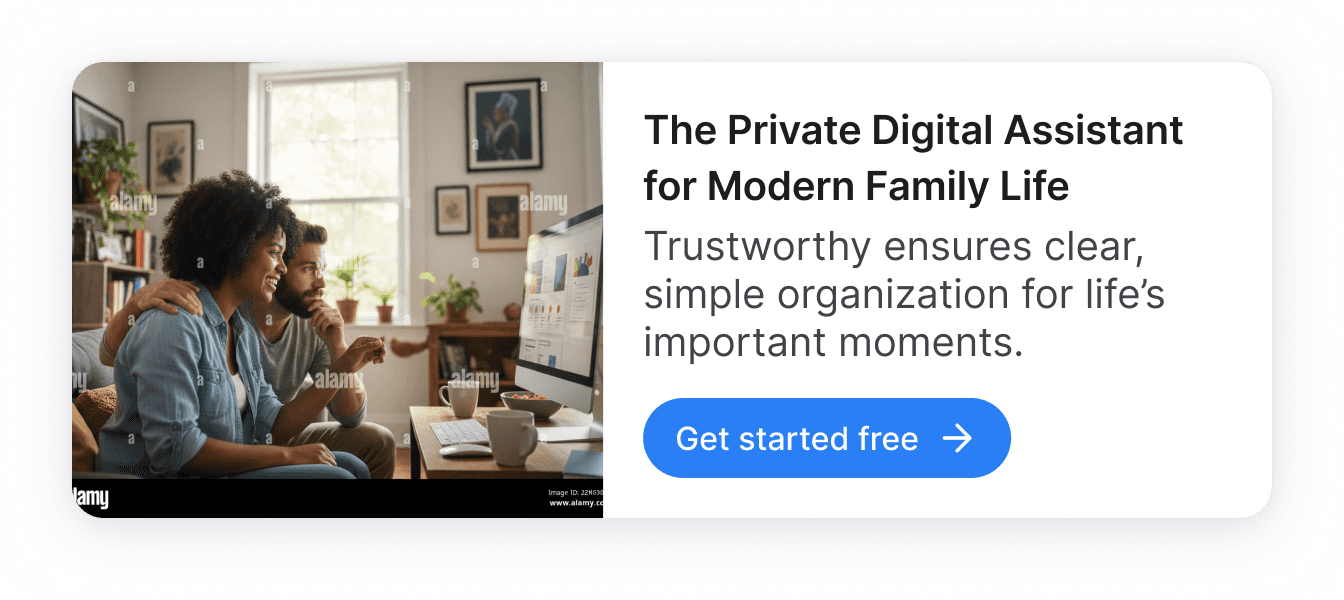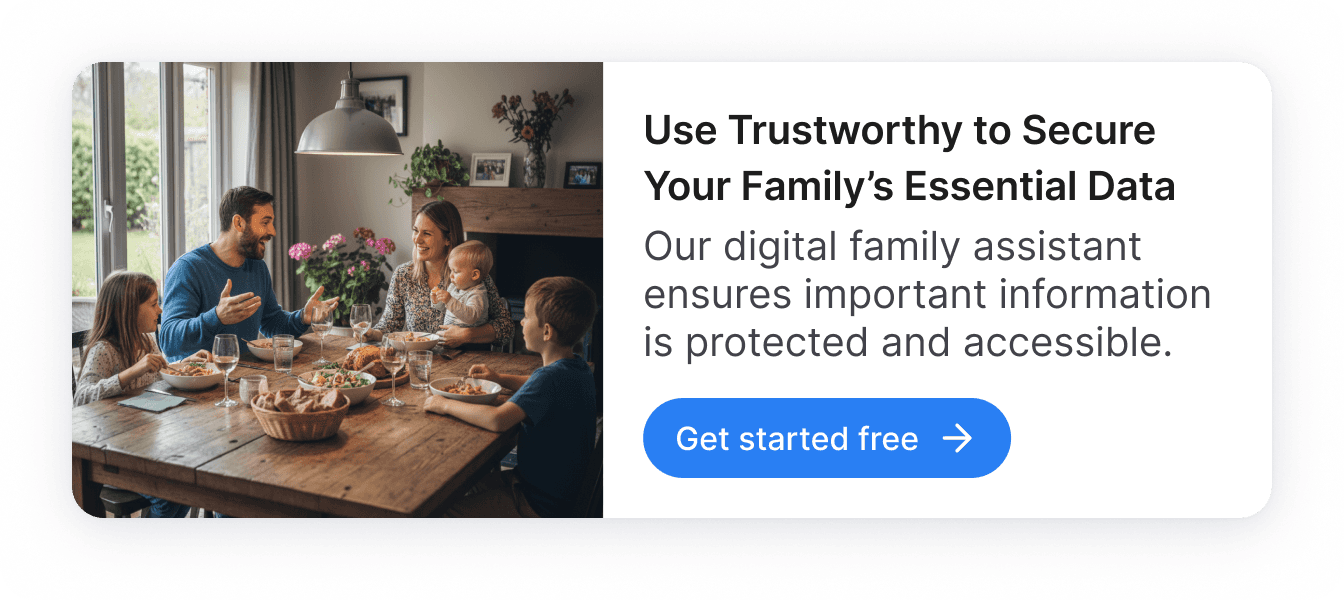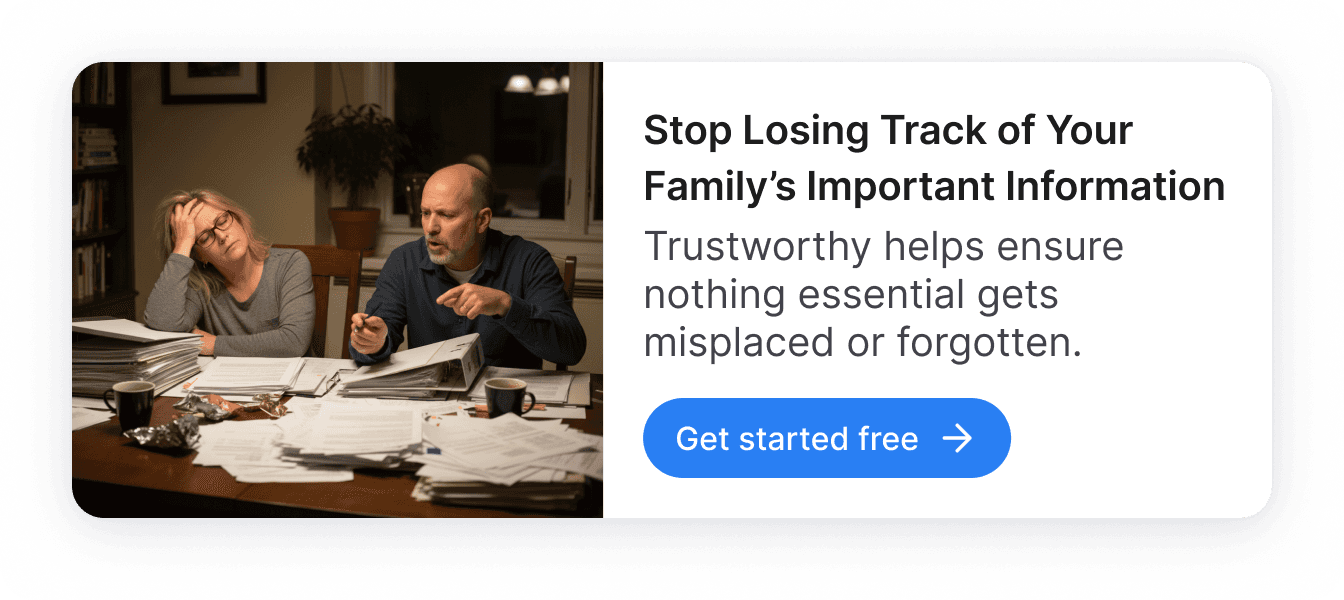
Key Takeaways
You can give someone access to your safety deposit box by having them sign a joint renter form.
Banks do not allow informal or temporary sharing.
Lack of authorization can delay access during emergencies.
A digital vault like Trustworthy's provides both security and easier access to important information.
Is it possible to give someone access to your safety deposit box? Having a loved one or relative access your safety deposit box can help during potential emergencies in the future and is a common practice among couples and families.
However, before you run to the bank, you should consider the benefits and risks of giving someone joint access to your safety deposit box. In this guide, you’ll learn all about these risks, post-death safety deposit box procedures, and how to give access.
Is It Possible to Give Someone Access to Your Safety Deposit Box?
Yes, it’s possible to give someone access to your safety deposit box.
Attorney Thomas B. Burton from Burton Law LLC recommends: “If you have a safety deposit box and you name your child or a friend as the Personal Representative, I recommend giving them access to the box at the bank.”
Let’s discuss a few use cases and why you’d want to share access.

Post-Death Access
Accessing a safety deposit box after the owner dies is a tricky and time-consuming dilemma. Even if family members request access, the process may require attorneys, affidavits, and court letters.
If they’re lucky, they will only need to provide a death certificate, and your safety deposit box’s contents will be released to your wife or family.
You can avoid this if you give someone access as a joint renter. As long as they have a key and are registered as a joint renter, they will be able to access the safety deposit box without any issues upon your death.
Valuable Documents and Items
A shared safety deposit box can be optimal for couples who want to store important documents somewhere secure.

Let’s say you and your partner want to store the following items:
Birth certificates
Passports
Savings bonds
Insurance policies
Family jewelry
Not only would these valuables be in a safe and secure location, but either one of you could access them in the future. For instance, if you and your partner have plans to go on vacation, but you’re stuck at work all week, your partner could run to the bank and grab your passports.
However, storing important documents in your safety deposit box isn’t the best solution. Now that we live in the digital age, paper-based storage systems aren’t convenient or optimal.
Families are juggling more documents than ever before:
Home insurance
Life insurance
Car insurance
Mortgage documents
Financial planning documents
Medical records
It’s a hassle to access these documents from your safety deposit box whenever you need them, but they may also get lost or damaged.
This is why we recommend using Trustworthy's digital family assistant. Trustworthy helps families manage documents securely. Compared to other storage platforms, it’s more personalized, secure, and easy to use.
With a handy iPhone app or mobile website, you can access your important information wherever you are. Furthermore, you can give full or limited access to family members, finance professionals, or associates.
Organization is key when it comes to important documents, and Trustworthy is a comprehensive digital storage solution.
Steps Needed to Share Safety Deposit Box Access
Let’s discuss some steps to share access to your safety deposit box.
Visit the bank: To give someone access to your safety deposit box, you need to bring them to the bank where your box is located.
Sign the contract: Your loved one or friend will then need to sign the bank's rental contract as a joint renter.
The most important part of the process is their signature. If they choose to access the safety deposit box in the future, they’ll need to write their signature again to compare it with the original copy. This is how the process goes for the majority of banks.
However, your specific bank’s branch may have a different procedure, and different states have different laws. Visit your bank or give them a call to find out the exact details about giving someone access to your safety deposit box.

Granting Access to Your Safety Deposit Box After Your Death
The most convenient way to give someone access to your safety deposit box after your death is to share access with them as a joint renter.
If you’re unwilling to give someone shared access while you’re still alive, there are other solutions to post-death access. However, each state has its own laws on dealing with post-death safety deposit box access.
Here’s how to grant access to your safety deposit box after your death:
Provide a Key to the Person You Wish To Have Access: It’s essential to give the person you wish to have access a key to the safety deposit box. This exponentially eases the process with the bank.
Have a valid ID: Although laws vary from state to state, California law requires that a person accessing a safety deposit box provides a death certificate, driver’s license (or other valid ID), and the key to the box.
Get special permission: If the person accessing your safety deposit box doesn’t have a key, they will need to get special permission from the probate court to gain access. This is a time-consuming process that can cause massive headaches.
Take inventory of contents: Once the box is opened, the bank will take inventory of all the contents and make photocopies of all the documents. Only the will and trust can be removed from the safety deposit box.
Other items such as valuables can be removed by a designated personal representative of the estate. If there isn’t one, you will need to file for a small estate affidavit.
Transfer to a Living Trust
The best solution is to transfer your safety deposit box to your living trust before your death. This method involves the best balance between asset protection and ease of estate administration.
Your living trust can access your safety deposit box and its contents without the need for probate upon your death. The successor trustee will also be under a fiduciary duty to follow the terms of the trust in managing and distributing your assets, including those in your safety deposit box.
This means you won’t have to worry about them running off with your valuables without severe legal repercussions.
Are There Risks to Sharing Access to Your Safety Deposit Box?

Although it’s possible to give someone access to your safety deposit box, you should ask yourself a few questions before doing so.
Is this someone I completely trust
Will they need access to the items in the deposit box?
What if they run away with all the contents?
Your safety deposit box holds your most valuable and prized possessions. Therefore, you should have absolute faith and confidence that the person won’t take advantage of your safety deposit box.
The only risk is the joint renter's actions. If the joint renter empties the safety deposit box, it won't be the bank's fault.
Looking for a more accessible option than a safety deposit box? Trustworthy is the Family Operating System® that protects, optimizes, and organizes all of your important information.
Ensure your family is prepared for all of life's moments and emergencies with Trustworthy. Get started with Trustworthy for free.

Frequently Asked Questions
What are the disadvantages of a safety deposit box?
You should remember that the contents of your safety deposit box are often not insured, and they can only be accessed during the bank’s business hours.
What should never be stored in your safety deposit box?
You should never store money in your safety box because it is not insured by the bank.
What happens if you lose your safety deposit box key?
If you cannot access the spare key and you need to open your safety box, you will need to contact the bank, where they will likely drill into the lock.
How much does a safety deposit box cost?
Generally, the prices of a safety deposit box range from $15 to $150 per year.
Other Safety Deposit Box Resources
We’d love to hear from you! Feel free to email us with any questions, comments, or suggestions for future article topics.











